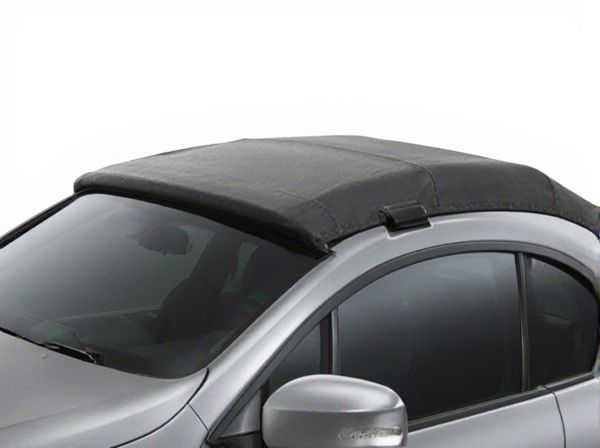
Photo illustration: Hardtop Roof vs Soft Top Roof
Hardtop roofs offer superior durability and enhanced security compared to soft top roofs, making them ideal for harsh weather conditions and long-term protection. Soft top roofs provide greater flexibility, lighter weight, and the option to enjoy open-air driving, enhancing your overall driving experience. Choosing between a hardtop and soft top roof impacts your vehicle's performance, maintenance needs, and aesthetic appeal.
Table of Comparison
| Feature | Hardtop Roof | Soft Top Roof |
|---|---|---|
| Material | Rigid metal or composite | Flexible fabric or vinyl |
| Durability | High resistance to weather and impacts | Less durable, prone to wear and tear |
| Noise Insulation | Superior soundproofing | Higher road and wind noise |
| Security | Better theft protection | Easier to breach |
| Weight | Heavier, affects fuel efficiency | Lighter, improves fuel economy |
| Convenience | Less flexible, requires manual or powered operation | Easy to fold or retract |
| Cost | Higher initial and maintenance costs | Generally more affordable |
| Appearance | Sleek, polished look | Sporty, casual style |
Overview: Hardtop vs Soft Top Roof
Hardtop roofs offer superior durability, security, and weather resistance compared to soft top roofs, making them ideal for long-term use and harsh climates. Soft top roofs provide enhanced versatility and a classic convertible experience with lightweight materials that fold easily for open-air driving. Choosing between a hardtop and soft top roof depends on priorities such as insulation, maintenance, aesthetic preference, and intended driving conditions.
Structural Differences
Hardtop roofs are typically constructed from rigid materials such as metal or reinforced plastic, providing increased durability, better insulation, and enhanced security compared to soft tops. Soft top roofs use flexible materials like canvas or vinyl, which allow for easier retraction but offer less protection from weather and noise. The structural design of hardtops supports greater resistance to impacts and wind, while soft tops prioritize lightweight construction and convertible functionality.
Durability and Longevity
Hardtop roofs offer superior durability and longevity compared to soft top roofs due to their rigid construction and resistance to wear from weather elements. Soft top roofs, commonly made from fabric or vinyl, are more susceptible to fading, tearing, and water damage over time, which can reduce their lifespan significantly. Investing in a hardtop roof ensures better protection against UV rays, storms, and physical impacts, making it a more long-lasting roofing option for vehicles.
Weather Resistance
Hardtop roofs offer superior weather resistance by providing a rigid, solid barrier against rain, snow, wind, and UV rays, ensuring better insulation and protection. Soft top roofs, typically made from fabric or vinyl, are more susceptible to leaks, damage from hail, and wear over time due to exposure to harsh weather conditions. Modern advancements in soft top materials improve durability, but hardtops remain the preferred choice for optimal weatherproofing and long-term reliability.
Noise and Insulation
Hardtop roofs provide superior noise reduction and thermal insulation compared to soft top roofs, significantly minimizing wind and road noise inside the cabin. Soft top roofs, typically made of fabric or vinyl, allow more external sounds to penetrate and offer less effective insulation against temperature extremes. Modern hardtop designs enhance acoustic comfort and energy efficiency, making them ideal for quieter, more insulated driving experiences.
Security Considerations
Hardtop roofs provide superior security compared to soft top roofs due to their rigid construction and resistance to break-ins, making them less vulnerable to theft and vandalism. Soft top roofs, typically made from fabric or vinyl, can be easily cut or torn, posing a higher risk in high-crime areas. For enhanced vehicle protection, especially in urban environments, hardtop roofs are the preferred choice for security-conscious drivers.
Maintenance Requirements
Hardtop roofs demand less frequent maintenance due to their durable materials, typically requiring only occasional cleaning and checks for paint or sealant wear. Soft top roofs need regular upkeep including cleaning, waterproofing treatments, and inspections for tears or mold to maintain fabric integrity and prevent leaks. Proper maintenance of either roof type extends lifespan, but soft tops generally require more consistent attention to preserve their condition.
Aesthetic Appeal
Hardtop roofs offer a sleek, modern look with clean lines and a polished finish that enhances a vehicle's overall aesthetic appeal. Soft top roofs provide a classic, sporty appearance that complements convertible cars, giving them a nostalgic and adventurous vibe. The choice between hardtop and soft top roofs significantly impacts the vehicle's style, with hardtops emphasizing durability and luxury, while soft tops highlight versatility and casual charm.
Cost Comparison
Hardtop roofs generally have a higher upfront cost compared to soft top roofs, with prices ranging from $1,000 to $5,000 depending on the material and vehicle model. Soft top roofs typically cost between $500 and $1,500, making them a more budget-friendly option for convertible owners. Maintenance and repair expenses for soft tops can be higher over time due to material wear, while hardtops often incur greater initial investment but lower long-term upkeep costs.
Which Roof is Best for You?
Choosing between a hardtop roof and a soft top roof depends on your lifestyle and driving needs. Hardtop roofs offer superior durability, security, and better insulation against weather and noise, making them ideal for year-round use in varied climates. Soft top roofs provide a lightweight, easily removable option for open-air driving and enhanced style, favored by those prioritizing flexibility and seasonal enjoyment.
 caratoz.com
caratoz.com